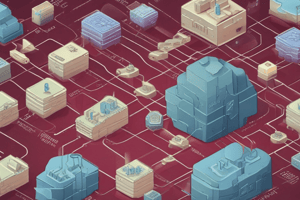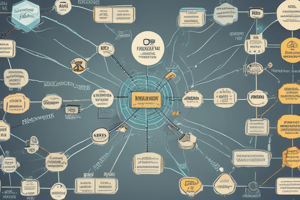Podcast
Questions and Answers
Which type of network is specifically designed to cover a small geographic area, such as a home or office?
Which type of network is specifically designed to cover a small geographic area, such as a home or office?
- WAN
- MAN
- LAN (correct)
- VPN
What is the primary function of routers in networking?
What is the primary function of routers in networking?
- Connect devices within a LAN
- Forward data packets between networks (correct)
- Provide wireless access to devices
- Manage data traffic within a single device
Which certification focuses on advanced networking skills and deeper knowledge in fields like routing and troubleshooting?
Which certification focuses on advanced networking skills and deeper knowledge in fields like routing and troubleshooting?
- CCDA
- CCNP (correct)
- CCNA
- CCIE
Which protocol is fundamental to internet communication and includes HTTP, FTP, and SMTP?
Which protocol is fundamental to internet communication and includes HTTP, FTP, and SMTP?
What is a common characteristic of managed switches compared to unmanaged switches?
What is a common characteristic of managed switches compared to unmanaged switches?
Which CISCO tool is specifically designed as a high-definition video conferencing system?
Which CISCO tool is specifically designed as a high-definition video conferencing system?
In the OSI model, which layer is primarily concerned with the transmission of raw data bits over a physical medium?
In the OSI model, which layer is primarily concerned with the transmission of raw data bits over a physical medium?
What distinguishes the CCIE certification from the CCNA and CCNP certifications?
What distinguishes the CCIE certification from the CCNA and CCNP certifications?
Which of the following options does not accurately represent a function of access points within a network?
Which of the following options does not accurately represent a function of access points within a network?
Which feature is part of Cisco Unified Communications?
Which feature is part of Cisco Unified Communications?
Flashcards are hidden until you start studying
Study Notes
Networking Fundamentals
- Definition: Networking is the practice of connecting computers and devices to share resources and information.
- Types of Networks:
- LAN (Local Area Network): Covers a small geographic area, like a home or office.
- WAN (Wide Area Network): Covers larger geographic areas, connecting multiple LANs.
- MAN (Metropolitan Area Network): Spans a city or a large campus.
- Key Protocols:
- TCP/IP: Foundation of internet communication; includes protocols like HTTP, FTP, and SMTP.
- OSI Model: Seven layers that define how data is transmitted over a network (Physical, Data Link, Network, Transport, Session, Presentation, Application).
- Network Devices:
- Routers: Forward data packets between networks.
- Switches: Connect devices within a LAN and manage data traffic.
- Access Points: Allow wireless devices to connect to a wired network.
CISCO Certification Tracks
- CCNA (Cisco Certified Network Associate): Entry-level certification focusing on networking fundamentals and IP connectivity.
- CCNP (Cisco Certified Network Professional): Intermediate certification for advanced networking skills and deeper knowledge in areas like routing, switching, and troubleshooting.
- CCIE (Cisco Certified Internetwork Expert): Expert-level certification requiring substantial networking experience, focusing on design, implementation, and troubleshooting complex network infrastructures.
- Specializations: Additional certifications in areas like Security, Collaboration, Data Center, and Service Provider.
CISCO Collaboration Tools
- Webex: Cloud-based video conferencing and online meeting platform.
- Cisco Unified Communications: Integrates voice, video, messaging, and presence into one platform.
- Cisco Jabber: Provides instant messaging, voice, video, and conferencing capabilities.
- Cisco TelePresence: High-definition video conferencing system for immersive meetings.
CISCO Routers And Switches
- Routers:
- Connect multiple networks and manage traffic between them.
- Examples include Cisco ISR (Integrated Services Router) and ASR (Aggregation Services Router).
- Switches:
- Operate at Layer 2 (Data Link) and Layer 3 (Network) of the OSI model.
- Types include:
- Managed Switches: Allow for control over the network and monitoring.
- Unmanaged Switches: Simple plug-and-play devices with no configuration options.
- Key Features:
- VLAN (Virtual Local Area Network) support for network segmentation.
- QoS (Quality of Service) for prioritizing network traffic.
CISCO Security Solutions
- Firewalls: Protect networks from unauthorized access; examples include Cisco ASA (Adaptive Security Appliance).
- Intrusion Prevention Systems (IPS): Monitor network traffic for suspicious activity and block potential threats.
- VPN (Virtual Private Network): Secure remote access solutions using technologies like SSL and IPsec.
- Identity Services Engine (ISE): Provides identity and access control for network devices, enforcing security policies.
- End-Point Security: Protects devices connected to the network from vulnerabilities and malware.
Networking Fundamentals
- Networking connects computers and devices for resource and information sharing.
- LAN (Local Area Network): Serves a small area like homes or offices.
- WAN (Wide Area Network): Covers broad regions, linking multiple LANs.
- MAN (Metropolitan Area Network): Encompasses cities or large campuses.
- TCP/IP: Core framework for internet communication, including protocols such as HTTP, FTP, and SMTP.
- OSI Model: Comprised of seven layers: Physical, Data Link, Network, Transport, Session, Presentation, and Application, outlining data transmission processes.
- Network Devices:
- Routers: Direct data packets among various networks.
- Switches: Facilitate connections within a LAN and regulate data flow.
- Access Points: Enable wireless devices to join wired networks.
CISCO Certification Tracks
- CCNA (Cisco Certified Network Associate): Entry-level certification covering networking basics and IP connectivity.
- CCNP (Cisco Certified Network Professional): Intermediate certification emphasizing advanced networking capabilities, routing, switching, and troubleshooting.
- CCIE (Cisco Certified Internetwork Expert): Expert certification requiring extensive networking background, focusing on complex network design, implementation, and troubleshooting.
- Specialization certifications available in disciplines like Security, Collaboration, Data Center, and Service Provider.
CISCO Collaboration Tools
- Webex: A platform for cloud-based video conferencing and online meetings.
- Cisco Unified Communications: Combines voice, video, messaging, and presence features into a cohesive system.
- Cisco Jabber: Offers instant messaging and voice/video conferencing functionalities.
- Cisco TelePresence: High-definition system designed for immersive video conferencing experiences.
CISCO Routers And Switches
- Routers: Connect various networks and manage inter-network traffic.
- Notable models include Cisco ISR (Integrated Services Router) and ASR (Aggregation Services Router).
- Switches: Operate at Layer 2 (Data Link) and Layer 3 (Network) of the OSI model.
- Managed Switches: Provide network control and monitoring capabilities.
- Unmanaged Switches: Require no configuration; simple plug-and-play devices.
- Key Features:
- VLAN (Virtual Local Area Network) support enables network segmentation.
- QoS (Quality of Service) prioritizes network traffic for better performance.
CISCO Security Solutions
- Firewalls: Safeguard networks from unauthorized access; an example is Cisco ASA (Adaptive Security Appliance).
- Intrusion Prevention Systems (IPS): Continuously monitor network traffic for suspicious activities, blocking potential threats.
- VPN (Virtual Private Network): Offers secure remote access through technologies like SSL and IPsec.
- Identity Services Engine (ISE): Manages identity and access control for network devices, implementing security policies.
- End-Point Security: Ensures devices connected to the network are protected from vulnerabilities and malware.
Studying That Suits You
Use AI to generate personalized quizzes and flashcards to suit your learning preferences.




